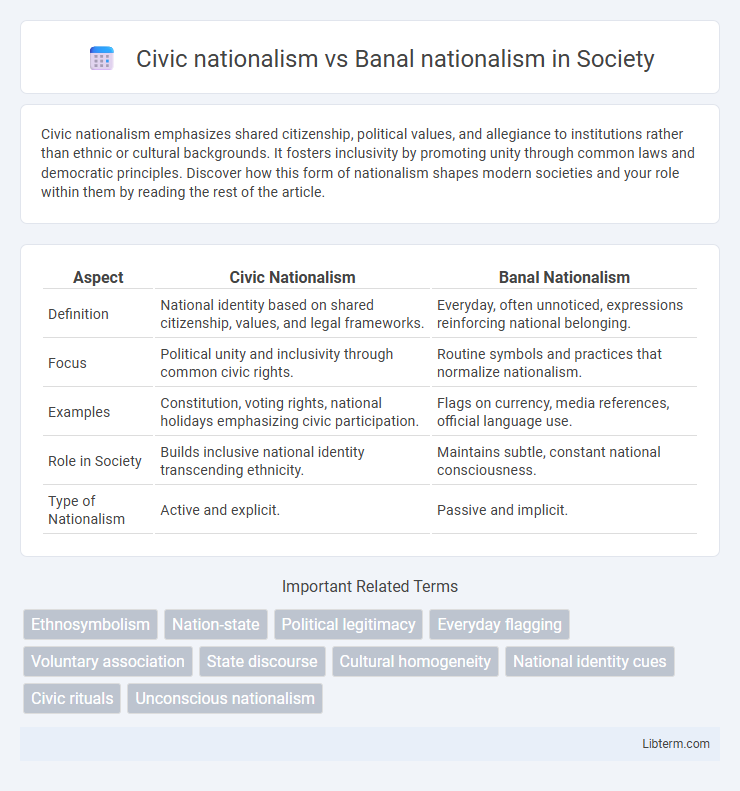Civic nationalism emphasizes shared citizenship, political values, and allegiance to institutions rather than ethnic or cultural backgrounds. It fosters inclusivity by promoting unity through common laws and democratic principles. Discover how this form of nationalism shapes modern societies and your role within them by reading the rest of the article.
Table of Comparison
| Aspect | Civic Nationalism | Banal Nationalism |
|---|---|---|
| Definition | National identity based on shared citizenship, values, and legal frameworks. | Everyday, often unnoticed, expressions reinforcing national belonging. |
| Focus | Political unity and inclusivity through common civic rights. | Routine symbols and practices that normalize nationalism. |
| Examples | Constitution, voting rights, national holidays emphasizing civic participation. | Flags on currency, media references, official language use. |
| Role in Society | Builds inclusive national identity transcending ethnicity. | Maintains subtle, constant national consciousness. |
| Type of Nationalism | Active and explicit. | Passive and implicit. |
Defining Civic Nationalism
Civic nationalism defines a political identity based on shared citizenship, values, and allegiance to democratic institutions rather than ethnicity or cultural heritage. It emphasizes inclusive participation, legal equality, and the protection of individual rights within a defined territorial state. This form of nationalism contrasts with banal nationalism, which represents the everyday, often unnoticed symbols and practices reinforcing national identity without explicit political intent.
Understanding Banal Nationalism
Banal nationalism refers to the everyday, often unnoticed expressions and symbols that reinforce national identity, such as flags on currency or national anthems played in public spaces, creating a subtle but continuous presence of the nation in citizens' lives. Unlike civic nationalism, which is based on shared political values and active participation in the nation-state, banal nationalism operates through routine practices and cultural norms that naturalize national belonging without conscious effort. This subtle normalization helps sustain national cohesion by embedding the nation into daily experiences, making national identity seem ordinary and unquestioned.
Historical Origins of Both Concepts
Civic nationalism emerged during the French Revolution as a political ideology emphasizing citizenship, legal equality, and shared civic values within a defined territory. Banal nationalism, a concept developed by Michael Billig in 1995, refers to the everyday representations and practices that reinforce national identity subtly and implicitly, rooted in the continuous presence of national symbols and rituals. While civic nationalism has clear historical foundations in revolutionary political movements, banal nationalism draws on long-standing cultural habits and societal norms that sustain national consciousness.
Key Characteristics Compared
Civic nationalism emphasizes shared values, political rights, and citizenship as the basis of national identity, promoting inclusion and individual participation in democratic institutions. Banal nationalism refers to the everyday, often unnoticed representations of the nation through symbols, language, and rituals that reinforce national belonging subtly. While civic nationalism is an explicit, ideological concept focused on active citizenship, banal nationalism operates passively through routine practices that normalize national identity.
Symbolism and Everyday Practices
Civic nationalism emphasizes shared political values and citizenship symbols such as flags, national anthems, and official holidays, fostering a collective identity through formal rituals and institutional participation. Banal nationalism operates through subtle, everyday practices like national media language, routine public displays of flags, and unspoken assumptions of national belonging embedded in daily life. While civic nationalism often manifests in conscious symbolic acts reinforcing unity, banal nationalism perpetuates national identity through habitual cultural cues that go largely unnoticed yet deeply shape social cohesion.
Political Implications and Governance
Civic nationalism emphasizes political unity based on shared citizenship and legal rights, promoting inclusive governance and democratic participation regardless of ethnicity or culture. In contrast, banal nationalism subtly reinforces everyday national identity through routine practices, influencing governance by embedding national loyalty within public institutions and social norms. The political implications of civic nationalism foster institutional inclusivity and equal representation, while banal nationalism shapes governance by legitimizing state authority through normalized national symbolism.
Inclusive vs. Subtle National Identity
Civic nationalism promotes an inclusive national identity based on shared values, citizenship, and political participation, emphasizing equality and diversity within the nation-state. Banal nationalism refers to the subtle, everyday representations of the nation that reinforce a sense of belonging through mundane practices and symbols, often taken for granted by citizens. While civic nationalism consciously constructs inclusion, banal nationalism operates invisibly, subtly embedding national identity in daily life.
Impact on Social Cohesion
Civic nationalism fosters social cohesion by promoting inclusivity based on shared values, laws, and political participation rather than ethnicity or culture, which strengthens collective identity in diverse societies. Banal nationalism, through everyday symbols and routines such as flags, national anthems, and public holidays, subtly reinforces national belonging and unity without overt political discourse. Together, these forms of nationalism influence social cohesion by shaping both active engagement in civic life and unconscious, routine solidarity among citizens.
Contemporary Examples in Society
Civic nationalism emphasizes shared values and citizenship, exemplified by the inclusive policies of countries like Canada and the United States promoting multiculturalism within a legal framework. Banal nationalism manifests through everyday symbols such as flags on public buildings, national anthems played during sporting events, and media portrayals, subtly reinforcing national identity without overt political messaging. Contemporary debates on immigration in the UK illustrate the tension between civic nationalism's inclusive ideals and banal nationalism's routine expressions of belonging.
Debates and Future of Nationalism
Debates around civic nationalism emphasize inclusive political identity based on shared values and citizenship, contrasting with banal nationalism, which highlights everyday, subtle expressions of national identity embedded in routines and symbols. Scholars argue the future of nationalism may blend these forms, as global interconnectedness challenges traditional nationalism while banal nationalism sustains subtle national consciousness. Emerging research suggests a shift towards dynamic, context-dependent national identities that incorporate both active civic engagement and passive, habitual national symbols.
Civic nationalism Infographic

 libterm.com
libterm.com